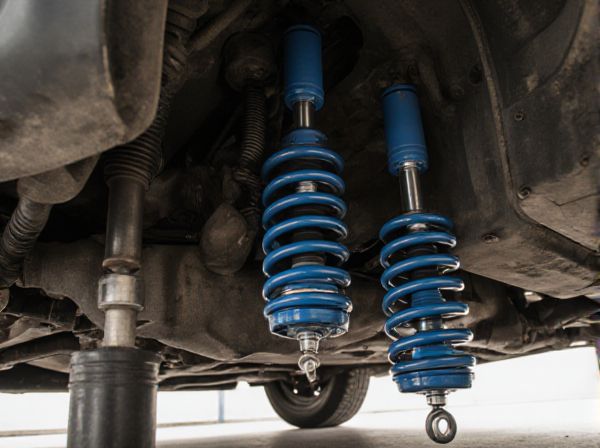
Photo illustration: Air Suspension vs Coil Spring
Air suspension offers adjustable ride height and improved comfort by using air-filled bags instead of traditional metal coils, adapting to varying road conditions. Coil springs provide a more straightforward, durable solution with consistent performance and lower maintenance costs. Your choice depends on whether you prioritize ride customization or simplicity and reliability in your vehicle's suspension system.
Table of Comparison
| Feature | Air Suspension | Coil Spring |
|---|---|---|
| Ride Quality | Superior comfort, adjustable stiffness | Consistent firmness, less adaptable |
| Load Handling | Automatically adjusts to load weight | Fixed capacity, less adaptive to load |
| Durability | Requires maintenance, prone to leaks | Robust and low maintenance |
| Cost | Higher upfront and repair costs | Lower initial and maintenance costs |
| Performance | Improved handling with electronic controls | Reliable but less dynamic |
| Installation | Complex, needs specialized equipment | Simple and straightforward |
Introduction to Suspension Systems
Suspension systems are essential components in vehicles that ensure ride comfort, handling, and stability by absorbing shocks and maintaining tire contact with the road. Air suspension utilizes compressed air in flexible bellows, allowing adjustable ride height and improved load leveling. Coil springs, made of steel, provide a durable and cost-effective solution with consistent performance across various driving conditions.
Overview of Air Suspension
Air suspension systems use compressed air to adjust the vehicle's ride height and provide a smoother, more adaptive driving experience compared to traditional coil springs. These systems include air springs, compressors, and electronic controls that dynamically adapt to road conditions, improving ride comfort and handling. Air suspension is commonly found in luxury vehicles, trucks, and SUVs seeking enhanced load leveling and superior ride quality.
Overview of Coil Spring Suspension
Coil spring suspension uses helical metal springs to absorb shock and maintain vehicle stability, providing a balance between comfort and handling. It is commonly found in passenger cars and light trucks due to its simplicity, durability, and cost-effectiveness. Coil springs offer consistent ride quality and require less maintenance compared to air suspension systems.
Key Differences Between Air and Coil Suspensions
Air suspension systems use air-filled bags to provide adjustable ride height and improved comfort, adapting automatically to load variations, while coil springs rely on metal coils for a fixed, consistent suspension response. Air suspensions offer superior damping control and are typically found in luxury and heavy-duty vehicles, enhancing ride smoothness and load leveling capabilities. Coil springs are more durable, cost-effective, and require less maintenance, making them common in standard automotive applications and off-road vehicles.
Ride Comfort Comparison
Air suspension systems deliver superior ride comfort by automatically adjusting to road conditions and load changes, providing a smoother and more controlled driving experience compared to coil springs. Coil springs offer a more traditional, fixed-rate suspension that can feel stiffer and less adaptive on uneven surfaces, resulting in a less comfortable ride. Modern air suspension technology reduces vibrations and absorbs shocks more effectively, enhancing passenger comfort significantly over coil spring setups.
Handling and Performance Analysis
Air suspension systems offer superior adjustability and improved ride comfort by actively adapting to road conditions, providing enhanced handling and stability at various speeds. Coil springs deliver consistent performance with better responsiveness and a more connected road feel ideal for sporty driving due to their simpler mechanical design. Performance analysis shows air suspension excels in versatility and load leveling, while coil springs maintain durability and predictability under aggressive handling scenarios.
Cost and Maintenance Factors
Air suspension systems generally have higher upfront costs and more complex maintenance requirements compared to coil springs, which are more affordable and simpler to repair. Air suspensions involve components like air compressors, airbags, and sensors that may fail and require expensive replacements or professional servicing. Coil springs have fewer parts, reducing the frequency of costly repairs, making them a cost-effective choice for long-term vehicle maintenance.
Durability and Reliability
Air suspension systems offer adjustable ride quality and improved comfort but may require more frequent maintenance due to components like air bags and compressors that can wear out over time. Coil springs are known for their robust durability and long-lasting reliability, often outperforming air suspensions in harsh conditions without the need for complex repairs. Vehicles with coil springs tend to have fewer failure points, making them a preferred choice for those prioritizing low maintenance and consistent performance.
Applications: Best Use Cases for Each System
Air suspension systems excel in luxury vehicles, trucks, and SUVs requiring adjustable ride height and superior ride comfort, particularly for load leveling and off-road adaptability. Coil springs are best suited for standard passenger cars and performance vehicles where durability, simplicity, and consistent handling are prioritized, offering a reliable, cost-effective suspension solution. Commercial vehicles frequently utilize air suspension for heavy load management, while coil springs remain common in compact cars due to their lightweight and straightforward design.
Choosing the Right Suspension for Your Vehicle
Air suspension offers adjustable ride height and improved comfort, making it ideal for vehicles requiring customization and smoother rides, such as luxury cars and SUVs. Coil springs provide durability and cost-effectiveness, best suited for trucks and off-road vehicles needing consistent support and load-bearing capacity. When choosing the right suspension, consider vehicle type, driving conditions, maintenance preferences, and budget to ensure optimal performance and ride quality.
 caratoz.com
caratoz.com